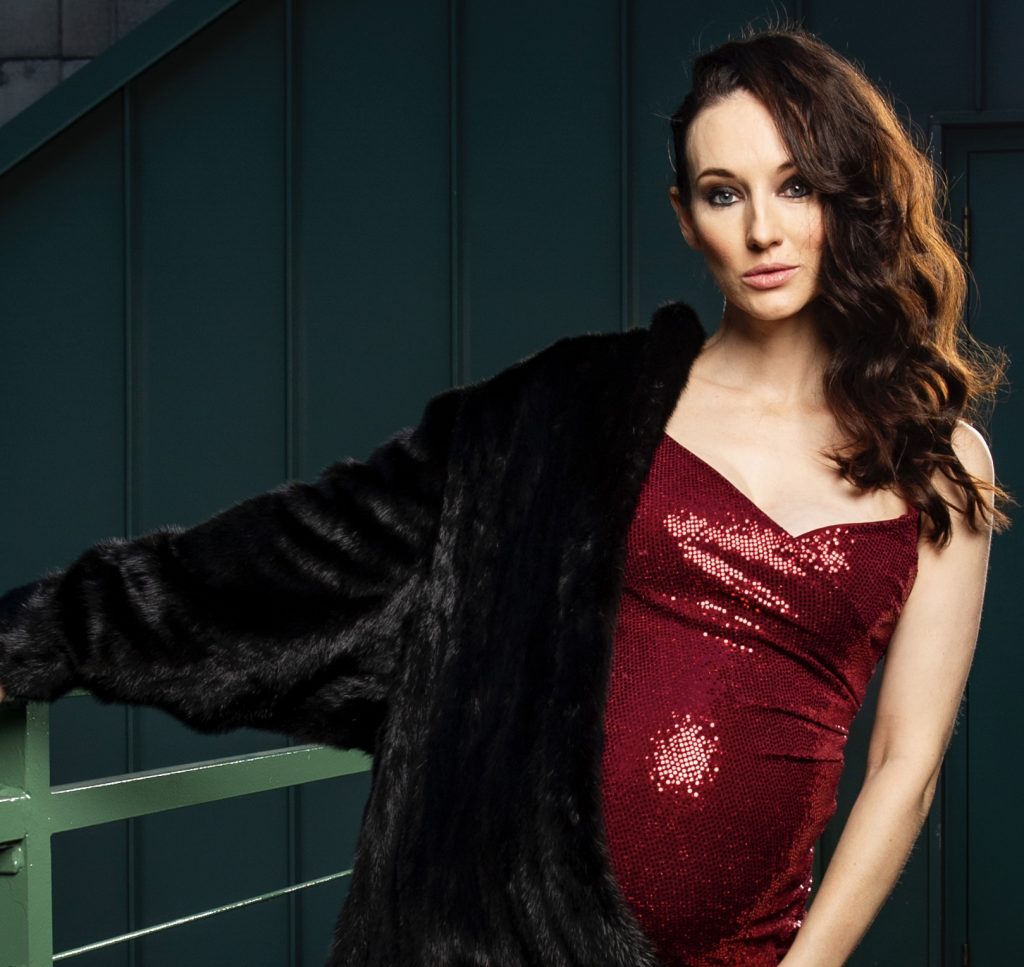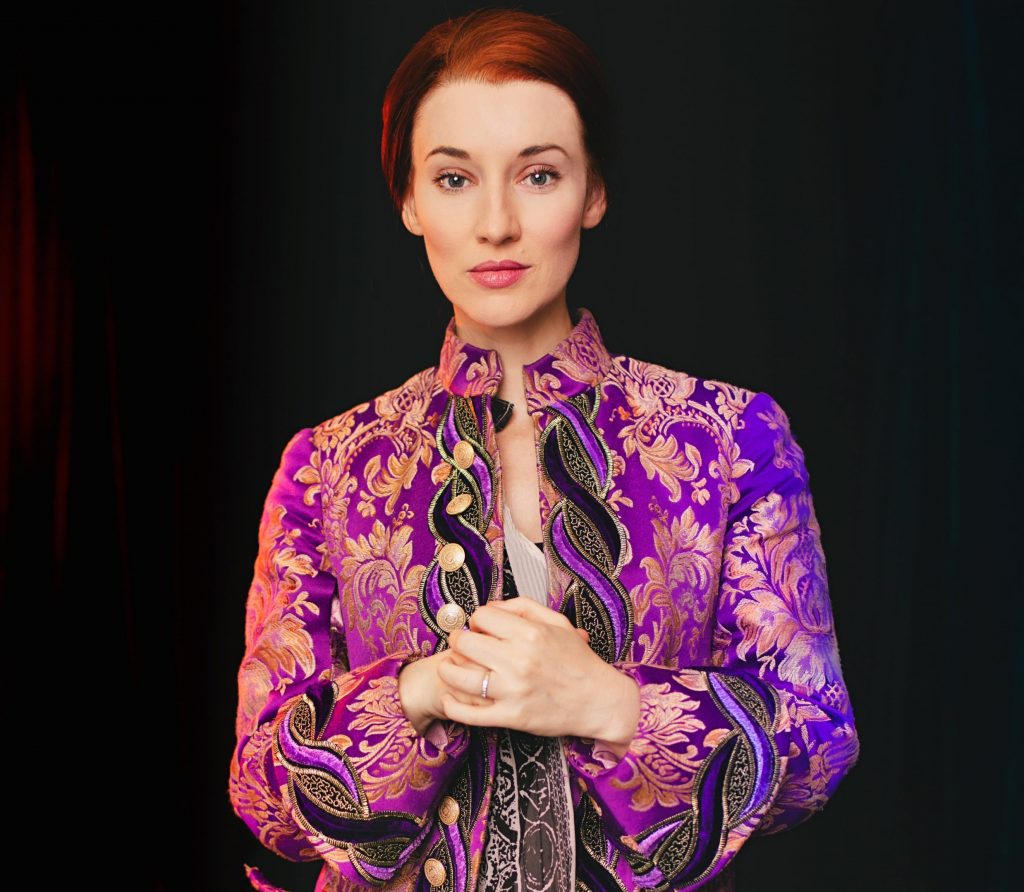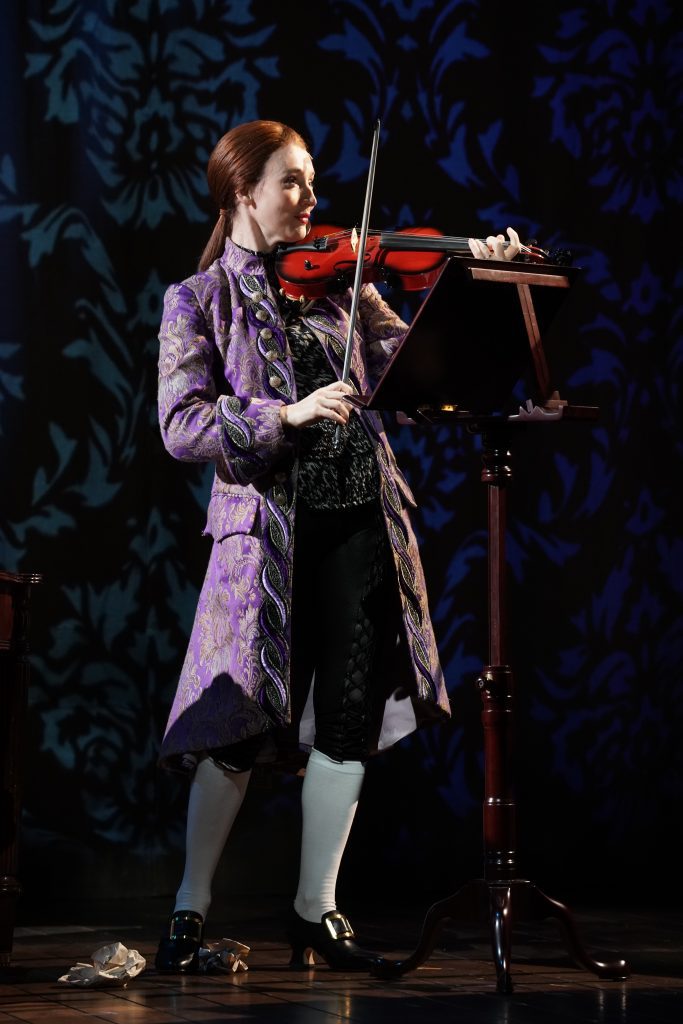Elizabeth Davis stepped out of the elevator on the 6th floor lounge of Broadway’s American Airlines Theater like an absolute queen. Around 33 weeks pregnant, her Ariel-like red hair shined as she sported a gorgeous a velour black dress, trendy cropped black coat and lilac stiletto heels. Yes, you read that right- 8 months pregnant in stilettos! What’s more impressive is that she performs 8 times per week as Thomas Jefferson in the Broadway revival of “1776.” Davis is not only singing and acting as Jefferson, she’s dancing and playing the violin as well. Not to mention, she has a 5-year-old at home. We feel lazy too, don’t worry!
The revival of 1776, directed by Dianne Paulus and Jeffrey L. Page, is described on the website as “A glorious multiracial cast of female, transgender, and nonbinary actors portrays the fiery founders of this country, putting history in the hands of the humans who were left out the first time around—and the result is an epic show of passion, debate, and roof-raising musical fireworks.” Although not all aspects of the production worked for us, we whole heartedly agree that this was an amazing production with a cast that truly loves each other. And for those of you curious about the purpose of the diversity casting; the goal is to remind us of the faces that were not considered during the Declaration of Independence’s writing. Now, we’ll get to some highlights from chatting with Elizabeth; but we would be remiss if we didn’t give some background on the offstage drama surrounding the show.

Photo : Daniel Rader
In a famous scene lead by Edward Rutledge (South Carolina), who is PRO-slavery; he expresses his frustration with his peers like Ben Franklin, John Adams and Thomas Jefferson, who advocated for the anti-slavery clause. Rutledge feels like they are hypocrites as they profit off slave ships and drink rum that was made by slaves. While the scene is clearly historical, it’s highly offensive today to people of color. The off-stage drama? Actor Sara Porkolob (she/they) who plays Edward Rutledge and identifies as Philippino, claimed she was offended after the creative team did not get her ‘consent’ in doing the scene as they did the people of color. According to Vulture, Porkolob stated:
“During the rehearsal process for “Molasses to Rum,” the Black folks were divided into an affinity Spaces where people of similar backgrounds can be grouped to share their perspectives without voices outside their group — in this case, the groupings were determined by race. separate from the non-Black people of color and the white folks. Our directors wanted to recreate a slave auction and, in doing so, they wanted consent from the Black folks in the play to carry out that vision — they were at the center of this piece, and we were using their Black bodies on stage. But then, the non-Black POC people and the white people were not given the same opportunity to consent to this reenactment. For the non-Black POC folks, another layer was added, because we were assimilated into whiteness with no consideration of how our personal identity intersected with this song or this history. So the directors, by using race as a binary in the construction of “Molasses to Rum,” unconsciously held up a false narrative by assimilating non-Black POC folks into whiteness, because they were prioritizing the Black folks.
And that’s okay. I saw that and I was like, That makes a lot of sense. But it’s clear that they haven’t done any dramaturgical research to talk about what it means for non-Black POC folks to be assimilated into whiteness, and it’s clear that the white people haven’t been asked for their consent either. Then we had a conversation at the beginning of the Broadway run to articulate the harm that was done. We were divided into affinity groups and given the opportunity to talk more about what that harm felt like, and to give our consent to the enactment.”
When I asked Elizabeth Davis about how the drama with Porkolob affected her and the rest of the cast, she diplomatically replied that it just wasn’t her story to tell. My personal opinion was that it was highly inappropriate of Porkolob to give an interview like that in the middle of the show’s run- it comes across as truly ungrateful and totally privileged. Sara Porkolob has since apologized.

Photo:Grace Stockdale of Songbird Studios
Back to the classy Ms. Elizabeth Davis. Davis is a Tony Award & Drama Desk Award nominated actor for her roles in Broadway’s Tony-Winning ONCE, where she originated the role of Reza, and the revival of Roger & Hammerstein’s ALLEGRO. She is also an Innovative Theatre Award and NYMF Award Winner. We chat about her fertility struggles, the bond she has with her cast and crew, work/mom life balance, among many other things. Here’s a transcript of our interview, which I so thoroughly enjoyed:
Lauren Conlin:
Okay. So, first of all, you did an incredible job as Thomas Jefferson.
Elizabeth Davis:
Thank you.
Lauren Conlin:
You’re welcome. Danny [Elizabeth’s PR Rep] didn’t tell me that you were pregnant! How do you breathe, first of all, when you’re singing those notes and you have a baby blocking your diaphragm?
Elizabeth Davis:
I am singing a few alternate notes that our music director, Ryan Cantwell, was like, you know what? Don’t go crazy. So he gave me the option for a few alternate notes. I’m doing those just because I don’t need the stress and they feel just as exciting and as powerful for me, so I’m holding onto those.
Lauren Conlin:
Okay, okay.
Elizabeth Davis:
In general, I’m just considering it part of my workout. Because I don’t have time to be… With my son I was swimming every day, I was doing stretching and all of this. And so I just consider being at the theater and being on stage my workout. So I’m like, I’m just getting my breathing exercises in
Lauren Conlin:
Do you get to sleep in in the morning a little bit or do you have to get up and rush out with your son to get him to school?
Elizabeth Davis:
I’m up at 7:00.
Lauren Conlin:
That’s not even fair! You probably feel like you want to do it slash you have to do it because of your mom guilt? How do you balance everything? Because I just feel like as a mom, we’re guilty literally all the time and physically, it’s a lot. But nobody, I guess, really truly understands the mental load that we carry as well while doing everything else.
Elizabeth Davis:
The work life balance is really a stunning slap in the face, isn’t it? My husband and I both have weird schedules. My husband works in TV production, he is a director. And so for the past two mornings I took our son to school. He’s working the election tonight and I have an early show, so I’ll take him again in the morning. So I do three mornings.
Lauren Conlin:
Oh right, because you have two shows tomorrow!
Elizabeth Davis:
Correct. So then on Thursday mornings, my husband will take. So our family production calendar is crazy. I’m bad at fractions, but if we can both just be hovering around if I’m at 40%, hopefully you’re at 60 and then blah, blah, blah. And together we can make this work if we’re working as a team.
Lauren Conlin:
Absolutely. I mean, I’m not certain about this, but I get the feeling that this cast, it’s either they have older kids or it’s like you and you have a toddler, but nobody else does. I feel like you were the only one in this cast with a little child and obviously pregnant.
Elizabeth Davis:
Jill Vallery in our cast, who plays Caesar Rodney. And also plays the representation of Robert Hemmings, I think her son is six.

Photo:Joan Marcus
Lauren Conlin:
Oh, okay. All right.
Elizabeth Davis:
She and I have had a lot of conversations about this exact balance and how hard it is to be 100% for your family and for your child and be 100% at work. I tend to think there’s an expectation that women are both of those things more so than men. In the same breath I say that, my husband is just an incredible teammate. Incredible teammate. Raised by a single mom of four kids and really understands what it is to lean in. So I’m very thankful for that, to have a hubby and a partner in him. Otherwise, I just don’t know.
Lauren Conlin:
I know. I know. And so when you started this journey, I think I read somewhere that you had just found out you were pregnant and it was like a total surprise?
Elizabeth Davis:
Yes. I was 15 weeks when I was completely confirmed. I found out July 5th, but I thought that I was going to be having a miscarriage.
Lauren Conlin:
Wow.
Elizabeth Davis:
For three weeks during doing the show in Boston, I was uncertain what was happening, and I continued to do the show every night.
Lauren Conlin:
Oh my gosh.
Elizabeth Davis:
Just having the show and my castmates be steady, consistent support, still saying these words about birthing a declaration, still hearing every night Benjamin Franklin play played by Patrina Murray say, waiting to be born or to die in birth all on your shoulders, Mr. Wilson.
Lauren Conlin:
Oh my gosh. Yeah.
Elizabeth Davis:
The resonance of the piece carried me throughout a very confusing unknown period. And then I didn’t find out until July 21st with definition that I was 15 and a half weeks pregnant.
Lauren Conlin:
WOW. That is definitely God’s grace right there. Are you kidding?
Elizabeth Davis:
I do believe it was God’s grace. I was protected for about, I mean, I had walked through a very difficult journey of pregnancy loss in the year before. So to not know was actually the best thing that could have happened to me because I didn’t have to worry what everything in my body meant. I didn’t have to wonder, should I be feeling this? What is this sign and signal?
Lauren Conlin:
You’re so right. What we go through. I mean, probably wouldn’t be surprised, but you just saying that, I went through the same, and it’s almost like when you finally do get pregnant, after all those losses, you literally worry about everything. It’s funny because I couldn’t even enjoy it because I just wanted to get to those milestones -16 weeks, 24. weeks You know what I mean? I’m actually so happy for you sitting here knowing that you were basically 16 weeks and then you were like, okay, cool. Yeah, I’m pregnant. This is great.
Elizabeth Davis:
15 weeks, four days.
Lauren Conlin:
Yeah. Amazing.
Elizabeth Davis:
My goodness. It was the Harvard Hospital and everything completely out of my home element, away from my doctors. And I’ve said this before, but my cast mates carried me. I had two cast mates who would go to my appointments because my husband was back in New York working. And so it really became, in the same way that the show is focused on this unique grouping of women, trans binary individuals, I was surrounded by that in the process of making a life, on top of making a show. So two women in particular, Shawna and Lulu and our cast, I would go into their dressing room and I would eat crackers and lay on the floor. So they’ve become aunties for life.
Lauren Conlin:
That’s so nice.
Elizabeth Davis:
And being here, the rest of the cast has become the same. Because I didn’t know that the first day of rehearsal, I showed up on April 2nd that I was pregnant. I had no idea. So, which means that the entirety of this process has been both creating a show and creating a human.
Lauren Conlin:
That’s amazing. That’s so special to just amazing to put it out there .Now, what exactly drew you to this show and this unique way of doing the show? Because it is unique. I saw it, and I will be honest, I wasn’t sure at first. I was like, I don’t know if this is going to work. I don’t know if this is going to be a Hamilton knockoff. I wasn’t sure. I thought it worked. I thought there were parts of it that didn’t necessarily work for me, but I thought that overall it was great. So what drew you to this?
Elizabeth Davis:
Well, it was kind of the inspiration for Hamilton. It won the Tony in 1969. And so it was a genre unto itself that then Hamilton had to build upon. I feel that it is an established part of the cannon of the musical theater cannon. It has the longest book scene in musical theater history, scene three. I was very interested in the idea of diving into historical figures that I really didn’t know anything about. Were in such a divisive moment right now where one side of the aisle is pretending that they understand American history and the other side of the aisle is pretending, no, we understand American history and ne’er do the two meet.
In this production, upon reading it, upon listening to the score, upon watching the movie, there really is a synthesis occurring. And I think what the common theme that’s floating to the top is nothing is easy. It was never easy. It’s not easy now. But for us to pretend as if we are unique human beings, we’re not. Humanity is humanity. Fighting for what you believe in, the core of it is the same. Whether you are in 1400, whether you are in 7 AD or whether you are in 1776, 1969 or 2022, the circumstances obviously change, the stakes change.
I looked at it as an amazing opportunity to understand something that I heard that was circulating everywhere, that I thought, I really don’t understand what this is. I really don’t understand the specifics. I just took it on as a research project.
I also find it interesting. I’ve never played a historical figure before. So that is an honor, a challenge. I love playing characters that, well, all good characters do have fatal flaws. I enjoy playing and I’ve played a lot of characters that are either are the wounded child archetype or deeply damaged in some way, but ultimately are hard to justify in some way. And so I believe that my task as an actor has often been through my career and this role is no different. Finding the why, finding the motivation for how you could find the circuitous route toward this person’s this is why I did this.
Lauren Conlin:
Right.
Elizabeth Davis:
That’s just from a character perspective. Obviously, there’s the topical history, obviously there is this split between Jefferson wrote, and I read it every night. I read it, the clause every night, The Abolishment of Slavery Clause, he wrote that.
Lauren Conlin:
I didn’t even realize that happened, my husband too. We saw it and we were like, oh my gosh, we had no idea that could have been abolished.
Elizabeth Davis:
He wrote that while simultaneously inheriting from his father-in-law 607 human beings. And then also what’s further more difficult to unpack is Jill Vallery, who I spoke, plays the representation of Robert Hemmings. We talk about the fact that the Hemmings and the Jeffersons family, they were family. It’s this very confusing layering of saying, how do you live together and love together as family and then one family being literally owned by the other, what does that look like? Jill and I have talked endlessly about that relationship.
All of these conversations that terrified me walking into the process now encourage me. They give me bravery to move forward in our public discourse. There have been so many discussions and wrestling’s in the rehearsal room. There have been so many things of saying the thing out loud that you’re afraid to say that has allowed people from all walks of life in the room to say, I disagree, but I love you and I know you have my best interest in mind, so I’m going to listen to you differently.
Lauren Conlin:
Love that. If we could all be like that, that would be amazing.
Elizabeth Davis:
We can’t do that right now because we’re divided by… First of all, we’re wearing masks, we can’t be together in spaces. And so to try to have these monumental conversations about monumental moments in history with any modicum of kindness seems impossible. And that’s something that this process has offered me personally, I think all of us, the space too, we call it brave space.
Lauren Conlin:
Brave space.
Elizabeth Davis:
The ability to be brave and to say, I don’t understand X, Y, Z. And someone say, I disagree with you. Here are the reasons why, let’s have a more robust conversation in that direction.
Lauren Conlin:
Just going off that, if you are uncomfortable, you don’t have to answer.
Elizabeth Davis:
Sure.
Lauren Conlin:
The controversy: and I want to call it, noise or gossip, just around what happened with Sara, your castmate. Me personally? I read the article and I tried to understand her point of view, and this is before I knew that she was the one singing this song for that scene. I don’t want to say that changed my view slightly (it did, though a tiny bit), but everyone I know who read it without seeing the show- they were like, that’s the most ridiculous thing I’ve ever heard. The most ridiculous thing. That is very presumptuous of her to even, blah, blah, blah. Now again, after seeing the scene, I’m like, okay, maybe she could have a point. I mean, I’m kind of still very confused, but did this affect you guys as a unified cast? Because I can imagine that must have caused a kind of riff between…
Elizabeth Davis:
Well, I appreciate you asking, and I hope you can understand that I don’t find it my place at this juncture in our cast moving forward to continue telling the story. Excuse me. I don’t feel at my place, or even my desire to add anything to that narrative right now. That’s not my desire. I would love for the African American women in our cast to be able to speak more openly about their thoughts since much of the conversation had to do with Molasses to Rum.
I don’t desire to speak further to that. My goal and my aim is simply to continue telling the story that we’re very proud of and focusing on the positive ways that our show can make a difference. And the personal hashtag I’m running with right now is, this is who we are. There` are so many things about our cast and about our story that I would love to talk about. And you being here right now is a part of that. And so I appreciate that.
Lauren Conlin:
Of course.
Elizabeth Davis:
But thank you for asking.
Lauren Conlin:
You were very graceful in your answer about it and you were very diplomatic. I love that for your career, for your family, for everything. I 100% get that.
Elizabeth Davis:
Look, our show is about a group of extremely diverse individuals trying to do an impossible task under impossible circumstances. And we are a very diverse group of people from all walks of life, working in one of the most difficult creative mediums there is trying to tell a very difficult story about a difficult moment in history. I think we’re going to continue to do a good job of weaving all of those threads together and doing our jobs every night to the best of our ability-
Lauren Conlin:
I forgot to even bring this up, but you play the violin.
Elizabeth Davis:
I do.
Lauren Conlin:
In the show, my husband was like, is she really doing it? I was like, no, no, no. Probably not. I’m, it’s probably someone in the… And then I was like, oh my gosh. She is. She’s so amazing. You literally are so amazing!
Elizabeth Davis:
Thank you so much.
Lauren Conlin:
So, so good. You really are. I mean, I really hope that you win an award for this because you-
Elizabeth Davis:
You’re so sweet.
Lauren Conlin:
I’m not that sweet. Thank you. But no, I’m really not. But I loved you and I loved Patrina, she was amazing.
Elizabeth Davis:
She’s my girl.
Lauren Conlin:
And then the other one I loved was, I forget her name, but the girl that played your wife.
Elizabeth Davis:
Oh, Erin.
Lauren Conlin:
Yes. I was like, whoa, that’s a voice too. I was like, wow. Wow.
Elizabeth Davis:
She left Phantom to do this.
Lauren Conlin:
Oh wow.
Elizabeth Davis:
We got Christine.
Lauren Conlin:
That’s so cool. Oh my gosh. So cool. I mean, you can tell you guys all really love each other on stage. You really are having a great time, and it makes it fun to watch. It’s like you have great energy and again, you’re a very cohesive group. From what I know, when I saw it, there was a ton of understudies. I can only imagine when everybody’s back like the original, I guess. But yeah, no, thank you so much. And if there’s anything that you want to add right now that you want anyone to know about the show or anyone to know about you, just throw it out there.
Elizabeth Davis:
Oh gosh. I love to write. People can check out my music on Spotify or Apple Music or wherever they do. So the parallel of playing Jefferson who wrote the Declaration, and simultaneously being a writer having several plays as well as music and in the hopper that I’m working on, that juxtaposition feels really sweet.
Lauren Conlin:
That’s so nice. I mean, I hope that you can take some time for yourself before the baby!
Elizabeth Davis:
I do too.
Lauren Conlin:
Yeah. I feel like that’s super important for you to do. Don’t feel guilty. Literally.
Elizabeth Davis:
No. My husband and I finally sat down today and we made a Google Sheets of all of just like 57 items that need to be accomplished in the next two months-
Lauren Conlin:
That’s not doing anything for yourself, just letting you know (laughter). You’re like, oh no, we said that was a really fun, I mean, it’s a spreadsheet and we did this. I’m like, no, no, no. That’s not what I meant.
Elizabeth Davis:
No, I know what you meant.
Lauren Conlin:
I meant you get a pedicure.
Elizabeth Davis:
I did yesterday.
Lauren Conlin:
Okay, good, good. I want you to get a massage, prenatal, splash aofchampagne, whatever, make a spritzer for yourself. Literally enjoy yourself.
Elizabeth Davis:
No, I did. I got my nails done yesterday.
Lauren Conlin:
Good. Okay. Good. It’s so important. Oh my gosh, it’s so important.
Elizabeth Davis:
No, you’re right.
Lauren Conlin:
I’m like so concerned. I’m like, I need you to do this because you work so hard.
Elizabeth Davis:
I promise.
Lauren Conlin:
But yeah, thank you so, so much for your time!
Elizabeth Davis:
Yeah, my pleasure.
“1776” is now playing at the American Airlines Theater- purchase tickets here.
Izamal :Yellow City in Yucatán, Mexico
